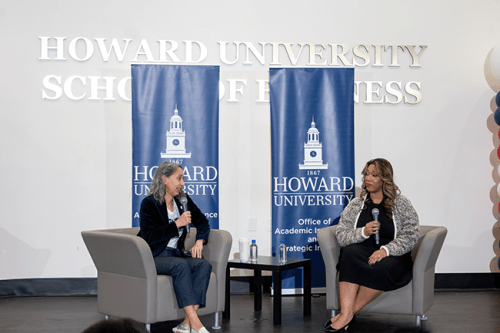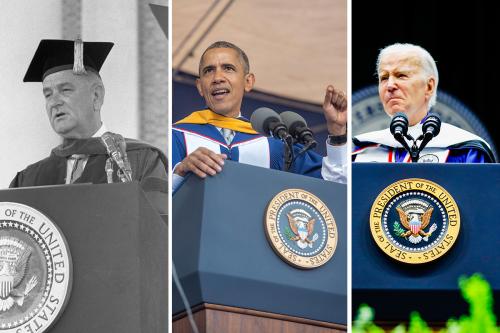WASHINGTON – The Howard University School of Business and PNC National Center for Entrepreneurship announced the hiring of its first national executive director, Erin Horne McKinney. The seasoned nonprofit executive will lead the center’s efforts to increase access to financial services and capital to Black and minority entrepreneurs and their small businesses.
Horne McKinney, a North Minneapolis native, has spent more than 20 years building diverse and inclusive technology and entrepreneurial ecosystems within public sector and nonprofit organizations. Most recently, she served as executive vice president of innovation and strategy for the Association of Enterprise Opportunity in Washington, D.C. Prior to that, Horne McKinney held several executive leadership positions including with the National Association of Multicultural Digital Entrepreneurs, WomenVenture in Minneapolis, Washington, D.C.’s executive office of the mayor, and at Cleveland-based JumpStart Inc.
“Erin brings a wealth of experience to the center, and visionary leadership that will help it serve as a leader in enhancing innovation and entrepreneurship instruction, and providing real-world learning and research opportunities for [historically Black colleges and university] students and faculty,” said Anthony Wilbon, dean of the Howard University School of Business.
Launched in 2021 through a five-year, $16.8 million grant from the PNC Foundation, the Howard University and PNC National Center for Entrepreneurship will serve as a national resource hub for the nation’s network of 101 historically Black colleges and universities (HBCUs) and their communities. Through a collaboration with Clark Atlanta, Morgan State and Texas Southern universities, the center will offer aspiring Black entrepreneurship enhanced educational, leadership development, and capacity-building resources and programming.
“The vision of the center is to be a catalyst for economic opportunity for HBCU students, HBCU alums and Black entrepreneurs broadly. What we're trying to do is provide that catalytic support and really be a resource for the larger community,” said McKinney, a two-time Howard alum. “There are significant barriers to Black entrepreneurship, so when we think about how to solve those problems, who better to do that than HBCUs, because some of our greatest minds and thinkers have come through these institutions and they have created significant change.”
Under Horne McKinney’s direction, the center and its three HBCU partners will each operate as a regional hub, coordinating programming, research and community outreach to all HBCUs within their respective region. A major focus for the center and its regional HBCU partners will be to expand access to entrepreneurship opportunities by engaging students, business owners and communities of color in growing their enterprises, with a goal of increasing employment and wealth for students attending HBCUs.
“Small businesses are important to the U.S. economy, and ensuring the success of Black businesses, particularly in low- and moderate-income communities, is critical in building a more diverse and inclusive economy," said Sally McCrady, chair and president of the PNC Foundation. “Through our collaborative work with HBCUs, we can empower and support Black entrepreneurs so they may grow and sustain their businesses with the hopes of building up the communities they serve.”
In addition to the $16.8 million awarded to establish the national center for Black entrepreneurship education and research in Washington, D.C., the PNC Foundation recently awarded more than $2.5 million to support entrepreneurial programs at seven HBCUs in North Carolina, Missouri and Delaware. The nearly $20 million awarded to HBCUs grants are part of PNC’s $88 billion Community Benefits Plan, which is inclusive of more than $1.5 billion commitment to support the economic empowerment of people and communities of color as well as low-and moderate-income communities.
The Community Benefits Plan will provide at least $88 billion in loans, investments and other financial support to benefit low-and moderate-income individuals and communities, people and communities of color, and other underserved individuals and communities over a four-year period.
# # #
About Howard University
Founded in 1867, Howard University is a private, research university that is comprised of 14 schools and colleges. Students pursue more than 140 programs of study leading to undergraduate, graduate and professional degrees. The University operates with a commitment to Excellence in Truth and Service and has produced one Schwarzman Scholar, three Marshall Scholars, four Rhodes Scholars, 12 Truman Scholars, 25 Pickering Fellows and more than 165 Fulbright recipients. Howard also produces more on-campus African American Ph.D. recipients than any other university in the United States. For more information on Howard University, visit www.howard.edu.
About PNC Foundation
The PNC Foundation, which receives its principal funding from The PNC Financial Services Group (www.pnc.com), actively supports organizations that provide services for the benefit of communities in which it has a significant presence. The foundation focuses its philanthropic mission on early childhood education and community and economic development, which includes the arts and culture and promotion of racial and social justice. Through Grow Up Great, its signature cause that began in 2004, PNC has created a bilingual $500 million, multi-year initiative to help prepare children from birth to age 5 for success in school and life.
Media Contacts:
Howard: Brittany Bailer; brittany.bailer@howard.edu
PNC: Angela Carducci; media.relations@pnc.com





